Politics
Trump is about to take credit for Biden’s accomplishments as president
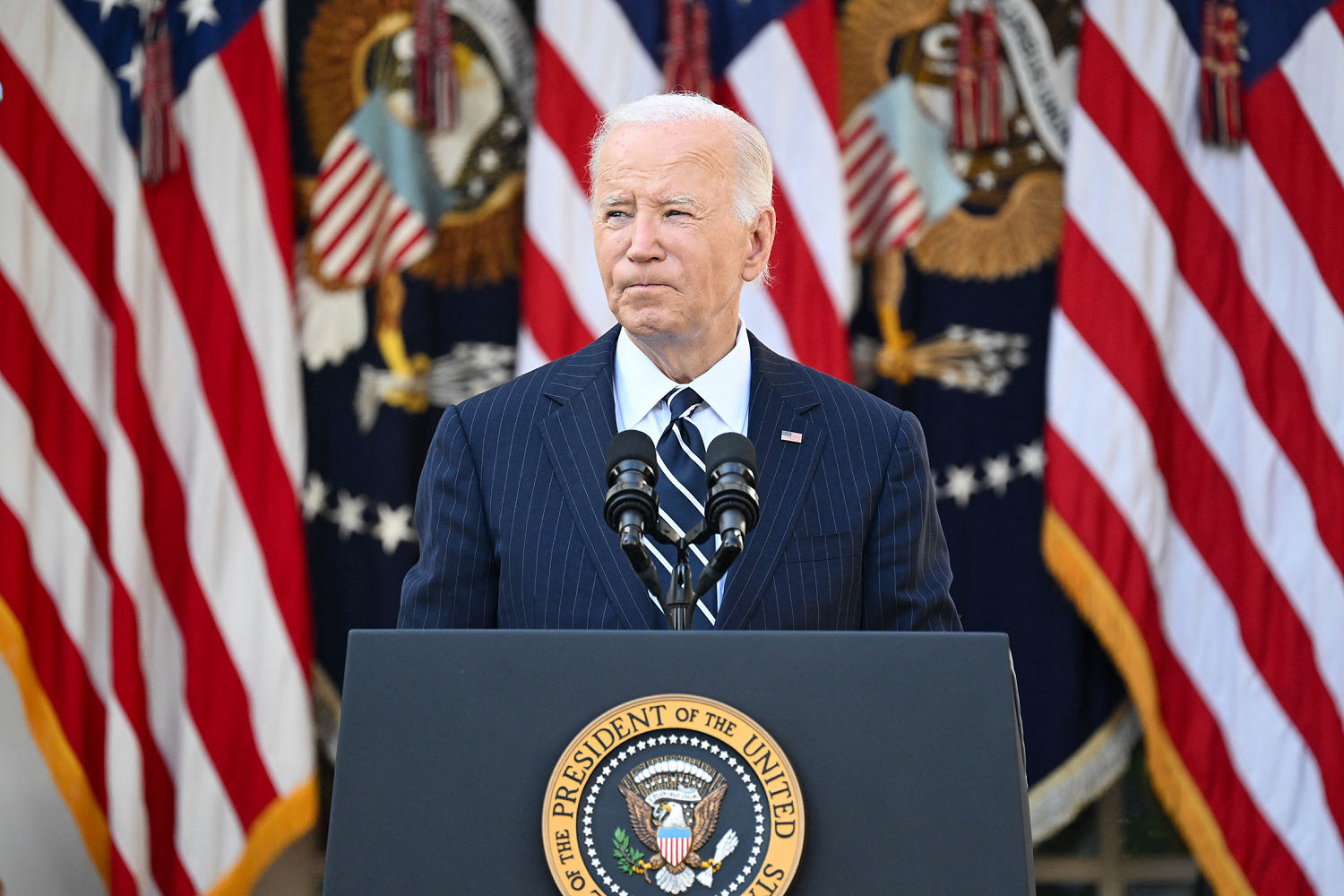
In what will be a generous gift to his successor, President Joe Biden beat inflation, brought down gas prices, created millions of jobs, spurred strong growth, boosted retirement savings and revived American manufacturing — just in time for Donald Trump to take credit for all of it.
Any objective assessment of Biden’s tenure would show him to have been a highly successful president.
Any objective assessment of Biden’s tenure would show him to have been a highly successful president, especially on economics (even if no president can actually bring down the price of gas all by himself). The fact that he is widely viewed as a failure shows just how warped our political and informational systems are.
In a perfect world, we’d all have a good understanding of the challenges presidents face, including what it would take to meet those challenges. We’d know what actions the president took and what the results were. We’d have at least some concept of how things could have gone differently — for better or worse.
Because we don’t live in that world, economics is where Biden has received the most criticism, and the overall judgment has been brutal. Most Americans have disapproved of his performance for the last three years (after a brief early honeymoon), and his approval ratings now hover in the high 30s.
Among the things for which Biden gets little acknowledgment is his legislative success. He signed a series of highly consequential bills, including the bipartisan infrastructure bill, the CHIPS and Science Act and the Inflation Reduction Act, which was by far the most important bill addressing climate change in the nation’s history.
Biden’s critics would say his approval ratings are low primarily because we went through a period of inflation, which people hate. Fair enough. But inflation happened all over the world as supply chains struggled to restart after the worst of the Covid pandemic. The decision we made in the U.S. to minimize the shock of the Covid recession by pumping money into the economy — a strategy that began while Trump was president — was clearly the correct one, saving the country from an explosion in unemployment.
America has recovered more quickly and more completely than almost any comparable country. As The Economist put it, “The American economy has left other rich countries in the dust.” Real wages have risen fastest for those at the bottom of the income scale. Today, inflation is at 2.4%, compared with the 9.1% peak in June 2022. The fight against rising prices has essentially been won.
But few in the electorate seem aware. Voters punish incumbent parties for inflation, whether or not it was their fault — and even after it’s over. That’s a phenomenon we’ve seen around the world this year. But the fact that voters in other countries are also blaming their governments for inflation doesn’t mean that Biden deserves blame for it, especially given how successful his economic policies have been more generally.
If your answer to that is “But there are still a lot of people struggling!” that’s true — but it is no more true than it has been for decades, and in many ways, it is less so. For instance, the proportion of Americans without health insurance is at an all-time low, thanks to Democrats (and Republicans are still hoping to repeal the Affordable Care Act, which would be catastrophic). You can argue that it would be better if Biden had solved the problem of inequality, but you certainly can’t say he did worse on that score than previous presidents.
In the inevitable circular firing squad Democrats and progressives are now assembling, one of the most prominent criticisms is that the party plays too much to its highly educated base, and if it wants to succeed then it must reconnect with working-class voters. As Sen. Bernie Sanders, I-Vt., said Wednesday, “It should come as no great surprise that a Democratic Party which has abandoned working-class people would find that the working class has abandoned them.”
Far from “abandoning” working-class people, Biden’s has been the most economically populist presidency in decades, probably since FDR’s.
Yet, far from “abandoning” working-class people, Biden’s has been the most economically populist presidency in decades, probably since FDR’s. He was the first president to walk a picket line, with striking autoworkers. His labor record has been exemplary: He banned noncompete agreements for most workers, expanded overtime pay and saved the pensions of hundreds of thousands of workers. The Federal Trade Commission is finally attacking monopoly power. The Consumer Financial Protection Bureau, which all but lay fallow under Trump, is protecting consumers again. The bills he signed have begun a manufacturing boom, focused purposefully on jobs that don’t require college degrees.
Vice President Kamala Harris promised to continue and expand on that progress. Did it convince voters that Democrats are the party of the working class? No, it did not. Yet, Trump, whose primary economic priorities are extending tax cuts for the wealthy and imposing huge tariffs that will be brutal for people of modest incomes, is supposed to be the “populist.”
There are many other things we could mention: student debt relief, Medicare’s finally being allowed to negotiate drug prices, Biden’s extraordinarily progressive record on judicial appointments and the fact that despite Republicans’ best efforts to find one, there has been no serious Biden administration scandal. A cynic might say that we can’t expect the average voter to appreciate all this, and while we certainly don’t expect them to, that doesn’t mean not appreciating it isn’t a problem.
If we want government to be responsive, we would hope that good governance would be rewarded and bad governance would be punished. But for that to occur, the public has to understand what’s actually happening. And for the most part, it doesn’t.
It’s partly a problem of inattention, compounded by the fact that policy gets more complicated all the time. It’s also about salesmanship; unlike recent presidents who got re-elected (Barack Obama, George W. Bush, Bill Clinton, Ronald Reagan), Biden isn’t a particularly skilled communicator. To make things worse, voters are swimming in a social media environment that is built to pull our attention to outrage and triviality. And the right is particularly adept at using those platforms to distract and deceive; just look at how Elon Musk turned what was Twitter into the engine of misinformation and far-right extremism that is X.
Biden’s unpopularity was an albatross that Harris couldn’t shake; the fact that it was largely unwarranted is no comfort. But Democrats need to realize that they have less a policy problem than a propaganda problem, one that is evident in both the messages the parties send and the systems through which information is delivered. If Democrats can figure out how to do something about that, they’ll be less likely to find themselves in the position they are now.
Trump will no doubt claim that he is responsible for everything good that Biden did. Worst of all, many people will believe him.
Politics
The 5 Democratic primary battles that’ll test the party’s future identity
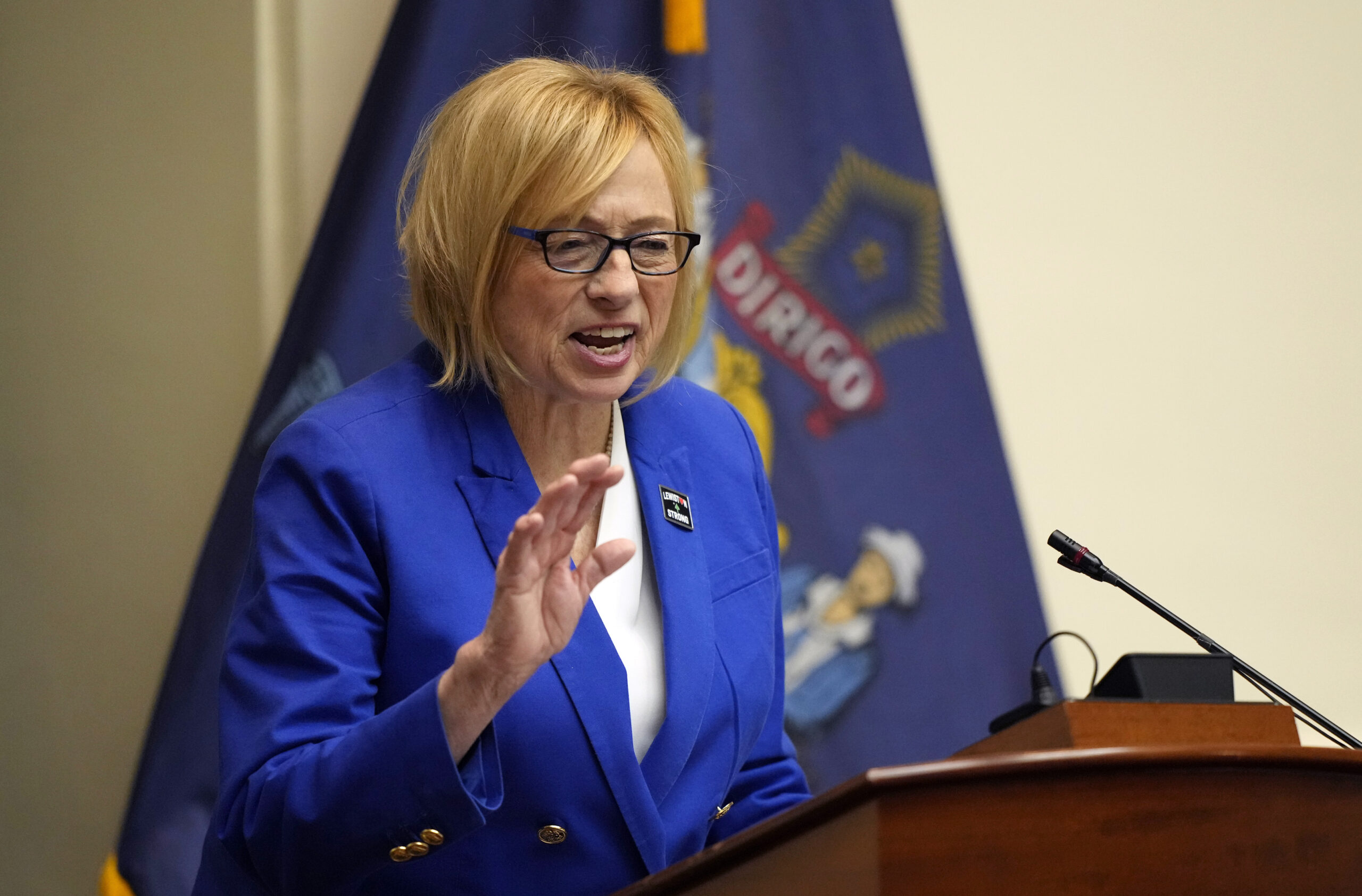
Gov. Janet Mills’ entrance into the Maine Senate primary on Tuesday reignited the familiar progressive-versus-establishment battle lines. A three-way clash in Michigan has exposed the ongoing divisions within the party over Israel-Gaza. And a wave of generational challenges to elderly House members have flared across the country.
Democratic primaries — already crowded, often messy and frequently retreading well-worn ideological fault lines within the party — are finally taking shape as top candidates jump in and filing deadlines approach.
Who wins these primary races will give early clues for how the party might emerge from the political wilderness in the wake of 2024 losses, as it looks to retake levers of power in Washington next fall. But they also present challenges for Democratic Party officials, often looking to control the primary process by pushing their preferred candidates and avoiding expensive intra-party clashes.
Mills, for example, was heavily recruited by Senate Minority Leader Chuck Schumer to enter the race, but she’ll now face well-funded primary opponent Graham Platner, an oyster farmer with the backing of Bernie Sanders (I-Vt.).
“The Democratic Party is undergoing a robust discussion with itself about how to win again. That means a lot of viewpoints, a lot of energy — and a lot of candidates,” said Ian Russell, a Democratic strategist who served as the Democratic Congressional Campaign Committee’s political director in 2016. “Candidates will have to prove whether their views, profiles and approach fit their districts or states. This process will be messy and unpredictable but is often unavoidable.”
Blue Light News compiled a list of the top Democratic primaries that will offer clues for how the party moves forward.
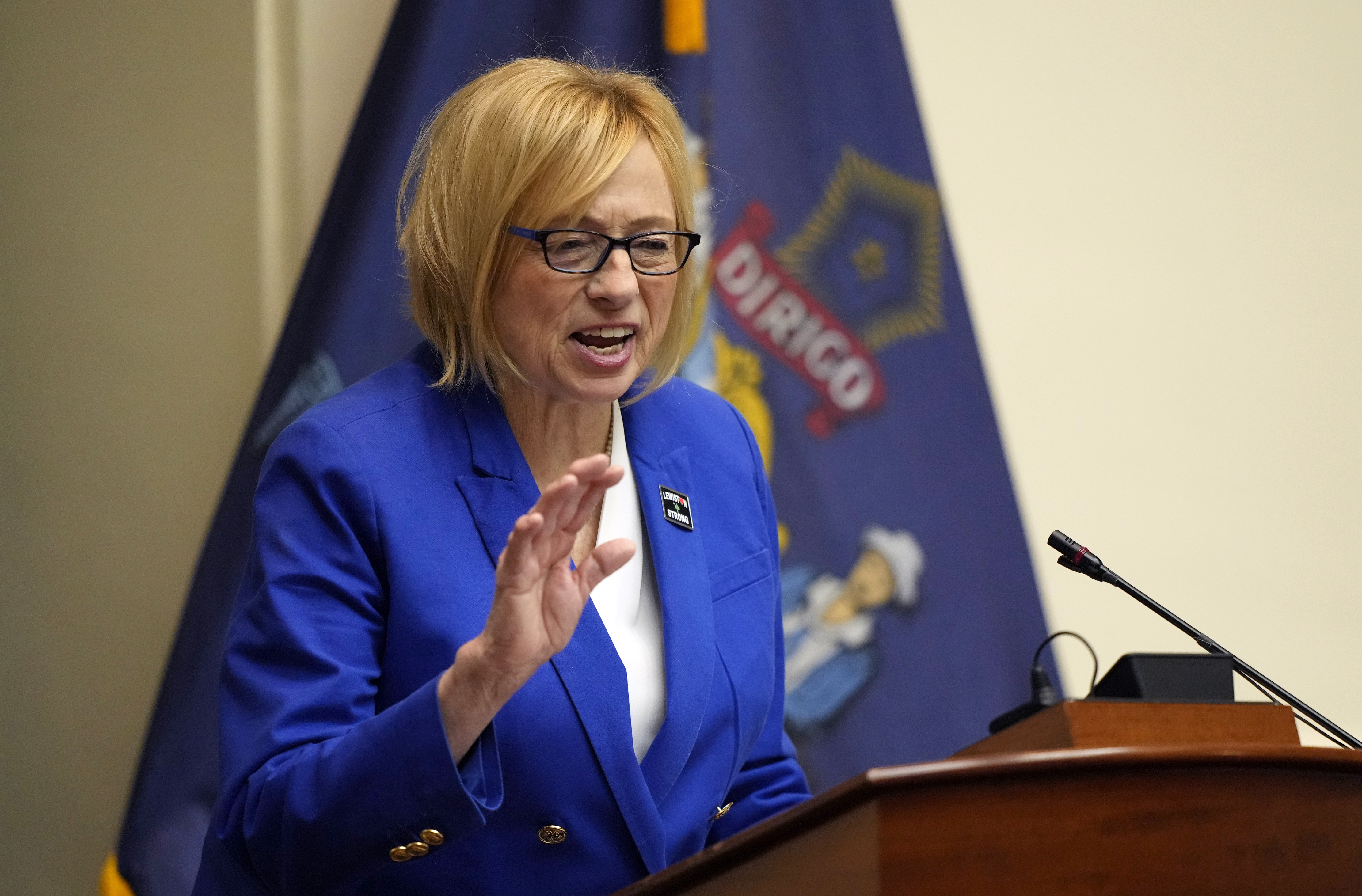
Maine Senate primary
Hours after Mills joined the race, her campaign and the Democratic Senatorial Campaign Committee formed a joint fundraising committee, making it clear who Washington Democrats prefer and providing a resource boon.
But it’s not clear whether the two-time governor’s establishment connections will help her in the primary — a familiar challenge in Democratic primaries.
Platner, who is in his early 40s and backed by a constellation of younger, progressive organizations, has already raised $4 million for his bid — a large sum for a first-time candidate. Jordan Wood, a 36-year-old former congressional aide whose campaign said he’s raised $3 million, is also running. Dan Kleban, a co-founder of the Maine Beer Company, dropped out on Tuesday and endorsed Mills.
Platner previewed some of the attack lines against Mills in The New York Times, saying that “going with someone who is very much of the establishment, going with someone who is very much of the party that has built the world we live in now, I think that runs a massive risk.”
There are also generational themes underpinning the race, as Mills, who is 77, is the oldest candidate in the race and would be the oldest freshman senator should she win. She has said that she only planned to serve one term, should she be elected.

Michigan Senate primary
The United States’ role in Israel is poised to take center stage again in the Michigan Senate race, where a trio of candidates, all with differing stances on the issue, are competing to replace retiring Michigan Sen. Gary Peters in a crucial battleground.
Earlier this month, state Sen. Mallory McMorrow called the conflict in Gaza a genocide, joining Abdul El-Sayed, a former Michigan health official, who has taken an even firmer stance against Israel’s actions. McMorrow’s comments represent not only the Democratic Party’s evolving views on Israel, but also how candidates hope to use the issue to differentiate themselves within the primary.
In contrast, Rep. Haley Stevens (D-Mich.) is backed by AIPAC, the pro-Israel group. AIPAC’s super PAC already dropped millions to boost Stevens in 2022, when she beat then-Rep. Andy Levin in a member-on-member primary. Democrats in the state expect AIPAC to spend heavily on behalf of Stevens again, which could also test Democratic primary voters’ willingness to accept big money interventions.
The state, home to a significant Arab-American population, saw the rise of the “uncommitted” movement to pressure then-President Joe Biden to take a stronger stance against Israel last year amid the war.
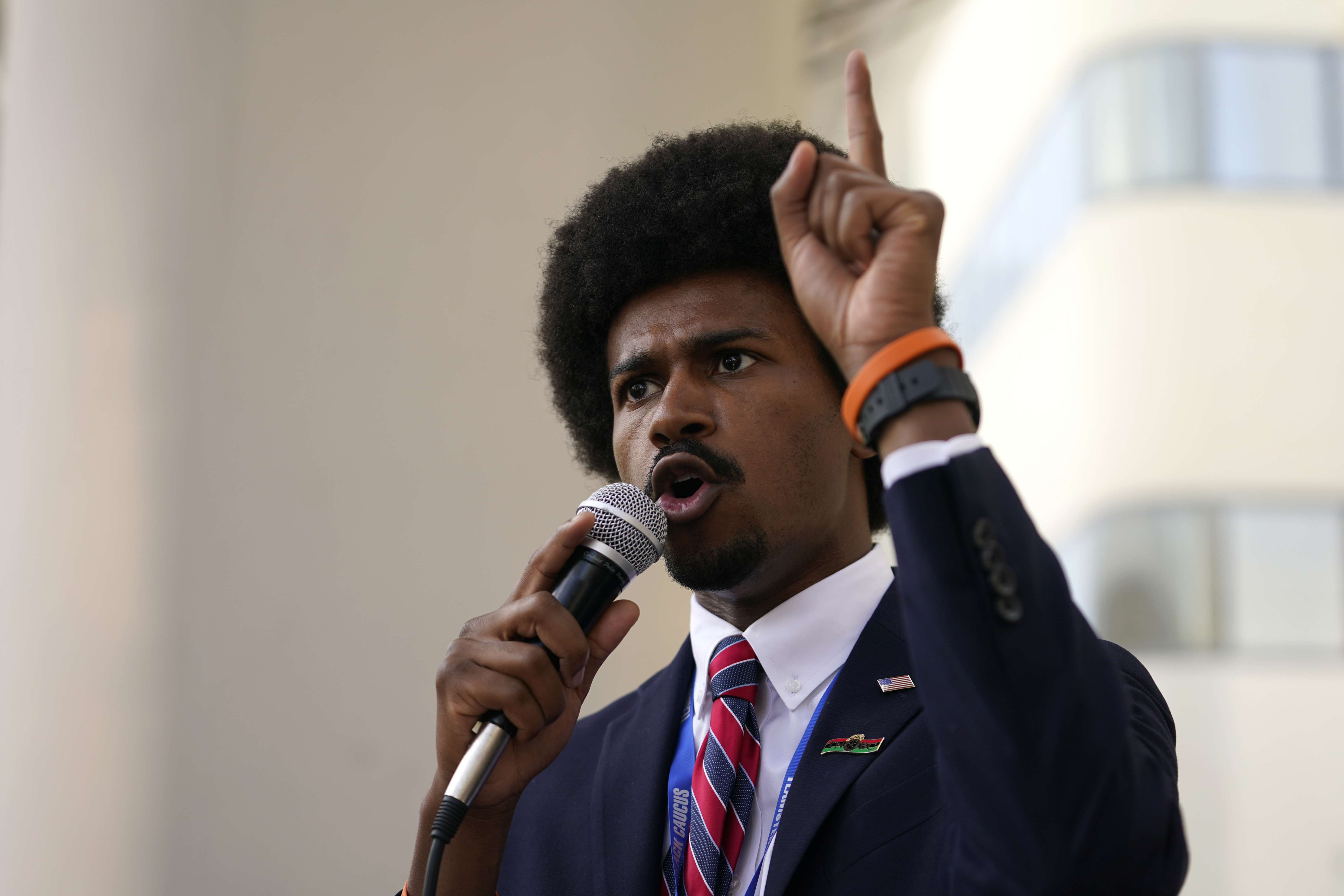
Tennessee’s 9th District primary
A handful of young, insurgent candidates have popped up across the country, challenging older, tenured House members, whom they have deemed generationally out-of-step in standing up to President Donald Trump.
Tennessee state Rep. Justin Pearson, the “Tennessee Three” member who announced his primary bid against 10-term Rep. Steve Cohen (D-Tenn.) last week, best represents this dynamic. Pearson, who is 30, instantly picked up support from David Hogg’s group, Leaders We Deserve, which pledged to spend $1 million against the 76-year-old Cohen.
The complaints are often stylistic rather than ideological, which could shed new light on primary voters’ preferences ahead of the 2028 presidential primary.
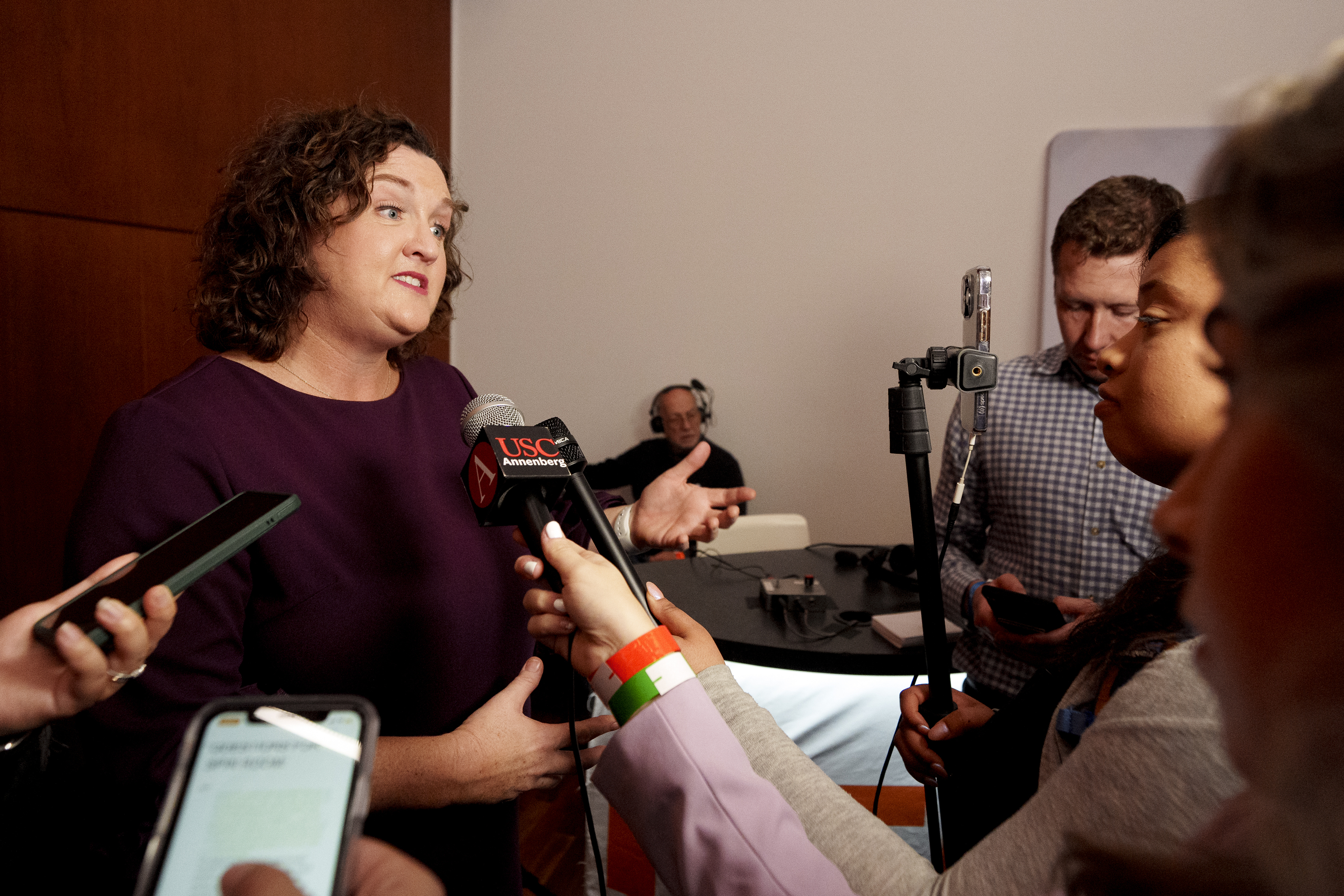
California gubernatorial primary
Voters in the biggest blue state, in picking its next governor, will confront what matters more: A candidate focused on standing up to Trump or dealing with the state’s non-Trump-related problems.
But, so far, there is no clear frontrunner answering that question. Former Rep. Katie Porter, who lost a 2022 bid for Senate, held a slight polling advantage before a recent contentious interview went viral. But several other Democrats are vying for a spot: former Los Angeles Mayor Antonio Villaraigosa, former Health and Human Services Secretary Xavier Becerra, former state comptroller Betty Yee and state superintendent Tony Thurmond.
And other high-profile candidates may still enter the race. Los Angeles businessman and former mayoral candidate Rick Caruso is often name-checked, as is Sen. Alex Padilla. It’s not clear if either will ultimately make the jump.
Another dynamic for Democrats could come in the general election, should the Republican candidates, Riverside County sheriff Chad Bianco and Fox News personality Steve Hilton, get locked out. If it’s a Democrat-versus-Democrat in November 2026, voters can deliver an even more clear answer on what it means to be a California Democrat, particularly on issues around crime and housing.
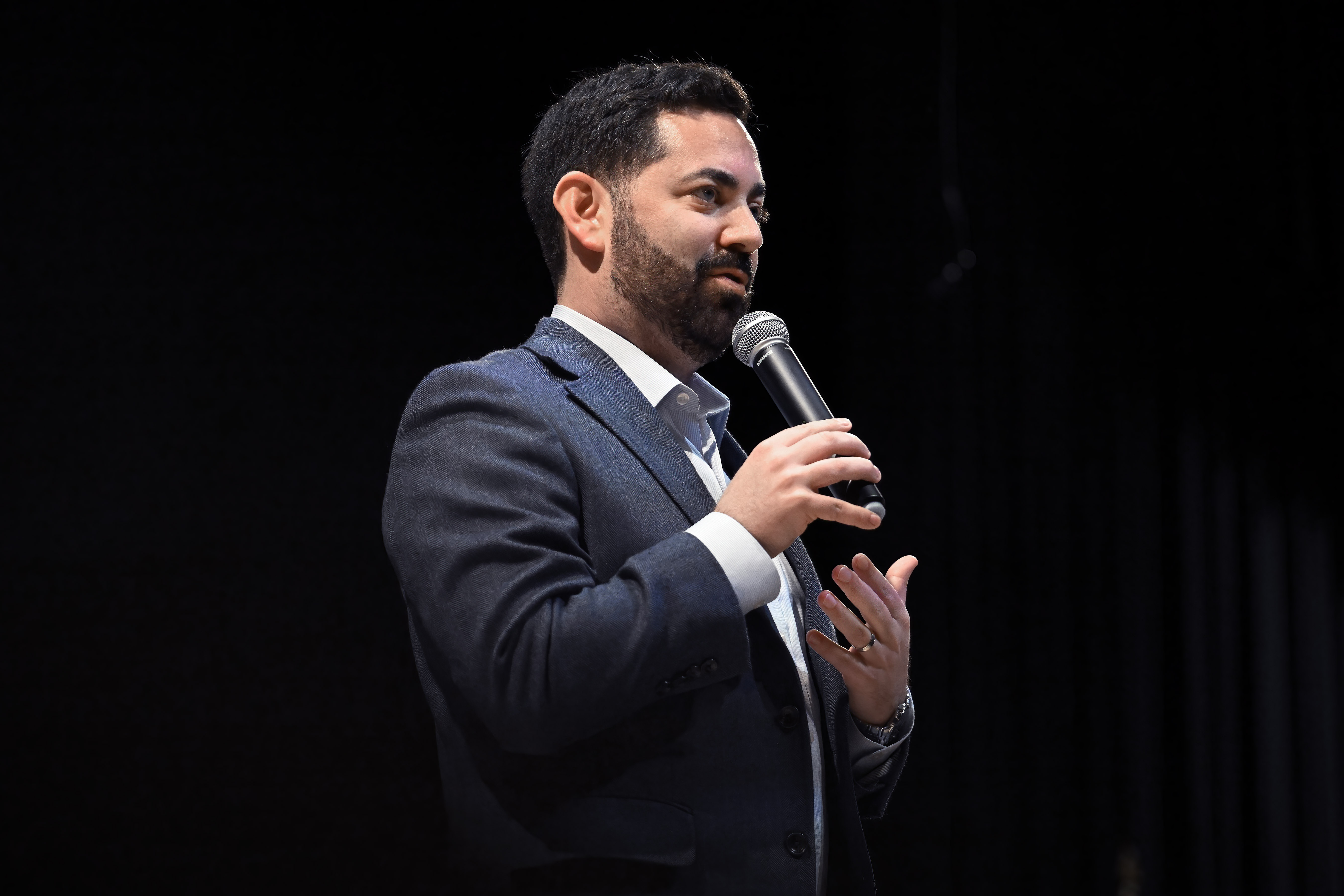
New York’s 17th District primary
This upstate New York district is one of only three House districts Kamala Harris won in 2024 that’s also held by a Republican, making it one of the most tantalizing pickup opportunities for Democrats in 2026. National Democrats are closely watching who might emerge from the unsurprisingly crowded primary, where eight candidates have jumped in to take on Rep. Mike Lawler (R-N.Y.) — with party leaders betting that more moderate candidates would be enticing to swing district voters.
Cait Conley, a former National Security Council official, and Beth Davidson, a Rockland County legislator, were both mentioned by national Democrats as potential swing seat stars, should they emerge from the primary.
“In 2018 Democratic primaries set the stage to win the House, [and] moderates with records of service won the day,” said Dan Sena, who served as the DCCC’s executive director in 2018. “One of the big questions for 2026 will be if the Democrats can again replicate that strategy and success.”
Melanie Mason contributed reporting.
Politics
‘I love Hitler’: Leaked messages expose Young Republicans’ racist chat

NEW YORK — Leaders of Young Republican groups throughout the country worried what would happen if their Telegram chat ever got leaked, but they kept typing anyway.
They referred to Black people as monkeys and “the watermelon people” and mused about putting their political opponents in gas chambers. They talked about raping their enemies and driving them to suicide and lauded Republicans who they believed support slavery.
William Hendrix, the Kansas Young Republicans’ vice chair, used the words “n–ga” and “n–guh,” variations of a racial slur, more than a dozen times in the chat. Bobby Walker, the vice chair of the New York State Young Republicans at the time, referred to rape as “epic.” Peter Giunta, who at the time was chair of the same organization, wrote in a message sent in June that “everyone that votes no is going to the gas chamber.”
Giunta was referring to an upcoming vote on whether he should become chairman of the Young Republican National Federation, the GOP’s 15,000-member political organization for Republicans between 18 and 40 years old.
“Im going to create some of the greatest physiological torture methods known to man. We only want true believers,” he continued.
Two members of the chat responded.
“Can we fix the showers? Gas chambers don’t fit the Hitler aesthetic,” Joe Maligno, who previously identified himself as the general counsel for the New York State Young Republicans, wrote back.
“I’m ready to watch people burn now,” Annie Kaykaty, New York’s national committeewoman, said.
The exchange is part of a trove of Telegram chats — obtained by Blue Light News and spanning more than seven months of messages among Young Republican leaders in New York, Kansas, Arizona and Vermont. The chat offers an unfiltered look at how a new generation of GOP activists talk when they think no one is listening.
Since Blue Light News began making inquiries, one member of the group chat is no longer employed at their job and another’s job offer was rescinded. Prominent New York Republicans, including Rep. Elise Stefanik and state Senate Minority Leader Rob Ortt, have denounced the chat. And festering resentments among Young Republicans have now turned into public recriminations, including allegations of character assassination and extortion.
A liberating atmosphere
The 2,900 pages of chats, shared among a dozen millennial and Gen Z Republicans between early January and mid-August, chronicle their campaign to seize control of the national Young Republican organization on a hardline pro-Donald Trump platform. Many of the chat members already work inside government or party politics, and one serves as a state senator.
Together, the messages reveal a culture where racist, antisemitic and violent rhetoric circulate freely — and where the Trump-era loosening of political norms has made such talk feel less taboo among those positioning themselves as the party’s next leaders.
“The more the political atmosphere is open and liberating — like it has been with the emergence of Trump and a more right wing GOP even before him — it opens up young people and older people to telling racist jokes, making racist commentaries in private and public,” said Joe Feagin, a Texas A&M sociology professor who has studied racism for the last 60 years. He’s also concerned the words would be applied to public policy. “It’s chilling, of course, because they will act on these views.”
The dynamic of easy racism and casual cruelty played out in often dark, vivid fashion inside the chats, where campaign talk and party gossip blurred into streams of slurs and violent fantasies.

The group chat members spoke freely about the pressure to cow to Trump to avoid being called a RINO, the love of Nazis within their party’s right wing and the president’s alleged work to suppress documents related to wealthy financier Jeffrey Epstein’s child sex crimes.
“Trumps too busy burning the Epstein files,” Alex Dwyer, the chair of the Kansas Young Republicans, wrote in one instance.
Dwyer and Kaykaty declined to comment. Maligno and Hendrix did not return requests for comment.
But some involved in the chat did respond publicly.
Giunta claimed the release of the chat is part of “a highly-coordinated year-long character assassination led by Gavin Wax and the New York City Young Republican Club” — an allusion to a once obscured internecine war that has now spilled into the open.
“These logs were sourced by way of extortion and provided to Blue Light News by the very same people conspiring against me,” he said. “What’s most disheartening is that, despite my unwavering support of President Trump since 2016, rouge (sic) members of his administration — including Gavin Wax — have participated in this conspiracy to ruin me publicly simply because I challenged them privately.”
Wax, a staffer in Trump’s State Department, formerly led the New York Young Republican Club — a separate, city-based group that is at odds with the state organization, the New York State Young Republicans. He declined to comment.
Despite his allusions to infighting, Giunta still apologized.
“I am so sorry to those offended by the insensitive and inexcusable language found within the more than 28,000 messages of a private group chat that I created during my campaign to lead the Young Republicans,” he said. “While I take complete responsibility, I have had no way of verifying their accuracy and am deeply concerned that the message logs in question may have been deceptively doctored.”
At least one person in the Telegram chat works in the Trump administration: Michael Bartels, who, according to his LinkedIn account, serves as a senior adviser in the office of general counsel within the U.S. Small Business Administration. Bartels did not have much to say in the chat, but he didn’t offer any pushback against the offensive rhetoric in it either. He declined to comment.
A notarized affidavit signed by Bartels and obtained by Blue Light News also sheds light on the intraparty rivalry that led the “RESTOREYR WAR ROOM” Telegram chat to be made public. Bartels references Wax as well. He wrote that he did not give Blue Light News the chat and that Wax “demanded” in a phone call that he provide the full chat log.
“When I attempted to resist that demand, after providing some of the requested information, Wax threatened my professional standing, and raised the possibility of potential legal action related to an alleged breach of a non-disclosure agreement,” Bartels claimed in the affidavit. “My position within the New York Young Republican Club was directly threatened.”
Walker, who now leads the New York State Young Republicans, touched on a similar theme, saying that he believes portions of the chat “may have been altered, taken out of context, or otherwise manipulated” and that the “private exchanges were obtained and released in a way clearly intended to inflict harm.”
He also apologized.
“There is no excuse for the language and tone in messages attributed to me. The language is wrong and hurtful, and I sincerely apologize,” Walker said. “This has been a painful lesson about judgment and trust, and I am committed to moving forward with greater care, respect, and accountability in everything I say and do.”
251 times
Mixed into formal conversations about whipping votes, social media strategy and logistics, the members of the chat slung around an array of slurs — which Blue Light News is republishing to show how they spoke. Epithets like “f—-t,” “retarded” and “n–ga” appeared more than 251 times combined.
In one instance, Walker — who at the time was a staffer for Ortt — talked about how a mutual friend of some in the chat “dated this very obese Indian woman for a period of time.”
Giunta responded that the woman “was not Indian.”
“She just didn’t bathe often,” Samuel Douglass, a state senator from northern Vermont and the head of the state’s Young Republicans, replied to Giunta.
In a separate conversation, Giunta shared that his flight to Charleston, South Carolina, landed safely. Then, he offered some advice for his fellow Young Republicans.
“If your pilot is a she and she looks ten shades darker than someone from Sicily, just end it there. Scream the no no word,” Giunta wrote.
Douglass did not respond to requests for comment.
In a statement, Ortt called for members of the chat to resign.
“I was shocked and disgusted to learn about the racist, anti-Semitic, and misogynistic comments attributed to members of the New York State Young Republicans,” Ortt said. “This behavior is indefensible and has no place in our party or anywhere in public life.”
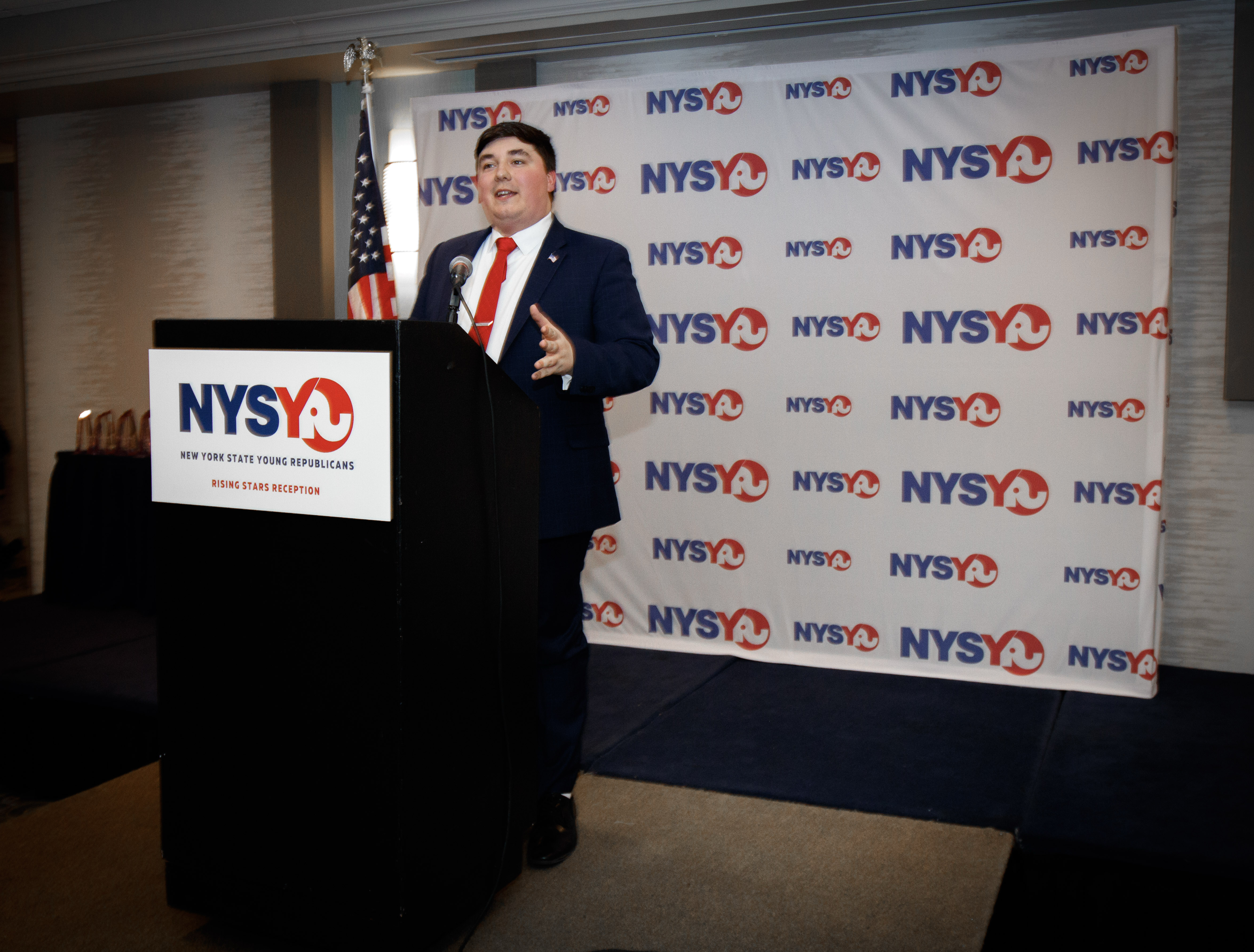
Walker had been in line to manage Republican Peter Oberacker’s campaign for Congress in upstate New York, but a spokesperson for the campaign said Walker won’t be brought on in light of the comments in the chat.
Seeking Trump’s endorsement
The private rhetoric isn’t happening in a vacuum. It comes amid a widespread coarsening of the broader political discourse and as incendiary and racially offensive tropes from the right become increasingly common in public debate. Last month, Trump posted an AI-generated video that showed House Minority Leader Hakeem Jeffries in a sombrero beside Senate Minority Leader Chuck Schumer, whose fabricated remarks were about trading free health care for immigrant votes — a false, long-running GOP trope. The sombrero meme has been widely used to mock Democrats as the government shutdown wears on.
In his 2024 campaign, Trump spread false reports of Haitian migrants eating pets and, at one of his rallies, welcomed comedian Tony Hinchcliffe, who called Puerto Rico a “floating island of garbage” and joked about Black people “carving watermelons” on Halloween.
Liz Huston, a White House spokesperson, rejected the idea that Trump’s rhetoric had anything to do with the chat members’ language.
“Only an activist, left-wing reporter would desperately try to tie President Trump into a story about a random groupchat he has no affiliation with, while failing to mention the dangerous smears coming from Democrat politicians who have fantasized about murdering their opponent and called Republicans Nazis and Fascists,” she said. “No one has been subjected to more vicious rhetoric and violence than President Trump and his supporters.”
In the “RESTOREYR WAR ROOM” chat, Giunta tells his fellow Republicans that he spoke with the White House about an endorsement from Trump for his bid to become chairman of the national federation. Trump and the Republican National Committee ultimately decided to stay neutral in the race.
A White House official said that it has no affiliation with RESTORE YR and that hundreds of groups ask the White House for its endorsement.
Giunta was the most prominent voice in the chat spreading racist messages — often encouraged or “liked” by other members.
When Luke Mosiman, the chair of the Arizona Young Republicans, asked if the New Yorkers in the chat were watching an NBA playoff game, Giunta responded, “I’d go to the zoo if I wanted to watch monkey play ball.” Giunta elsewhere refers to Black people as “the watermelon people.”
Hendrix made a similar remark in July: “Bro is at a chicken restaurant ordering his food. Would he like some watermelon and kool aid with that?”
Hendrix was a communications assistant for Kansas’ Republican Attorney General Kris Kobach until Thursday. He also said in the chat that, despite political differences, he’s drawn to Missouri’s Young Republican organization because “Missouri doesn’t like f–s.”

Blue Light News reached out to Danedri Herbert, a spokesperson for the attorney general who also serves as the Kansas GOP Chair, and shared with her excerpts of the chat involving Hendrix. In response, Herbert said “we are aware of the issues raised in your article” and that Hendrix is “no longer employed” in Kobach’s office.
In another exchange, Dwyer, the Kansas’ chair, informs Giunta that one of Michigan’s Young Republicans promised him the group “will vote for the most right wing person” to lead the national organization.
“Great. I love Hitler,” Giunta responded.
Dwyer reacted with a smiley face.
Few minority groups spared
Giunta, who serves as chief of staff to New York state Assemblymember Mike Reilly, ultimately fell six points short of winning the chairmanship to lead the Young Republican National Federation earlier this year — despite earning endorsements from Stefanik and longtime Trump adviser Roger Stone.
Reilly did not respond to requests for comment.
Earlier this year, Stefanik accepted an award from the New York State Young Republicans. She lauded Giunta for his “tremendous leadership” in August and had her campaign and the political PAC she leads donate to that state organization. Alex deGrasse, a senior adviser for Stefanik, said the congresswoman “was absolutely appalled to learn about the alleged comments made by leaders of the New York State Young Republicans and other state YRs in a large national group chat.”
“According to the description provided by Blue Light News, the comments were heinous, antisemitic, racist and unacceptable,” he continued, noting Stefanik has never employed anyone in the chat. “If the description by Blue Light News is accurate, Congresswoman Stefanik calls for any NY Young Republicans responsible for these horrific comments in this chat to step down immediately.”
Stone also condemned the comments in a statement.
“I of course, have never seen this alleged chat room thread,” he said. “If it is authentic, I would, of course, denounce any such comments in the strongest possible terms, This would surprise me as it is inconsistent with Peter that I know, although I only know him in his capacity as the head of the New York Young Republicans, where I thought he did a good job.”
Few minority groups are spared from the Young Republican group’s chat. Their rhetoric — normalized at most points as dark humor — mirrors some popular conservative political commentators, podcasters and comedians amid a national erosion of what’s considered acceptable discourse.
Giunta’s line on a darker-skinned pilot, for example, echoes one used by slain conservative activist Charlie Kirk last year when he said, “If I see a Black pilot, I’m going to be like, boy, I hope he’s qualified.” Kirk was discussing how diversity hiring “invites unwholesome thinking.”
Walker also uses the moniker “eyepatch McCain” (originally coined by conservative commentator Tucker Carlson) in an apparent reference to GOP Rep. Dan Crenshaw. Crenshaw lost his eye while serving as a Navy SEAL in Afghanistan. Walker also makes the remark, “I prefer my war heroes not captured,” a repeat of a similar 2015 line from Trump.
Art Jipson, a professor at the University of Dayton who specializes in white racial extremism, surmised the Young Republicans in the chat were influenced by Trump’s language, which he said is often hyperbolic and emotionally charged.
“Trump’s persistent use of hostile, often inflammatory language that normalizes aggressive discourse in conservative circles can be incredibly influential on young operatives who are still trying to figure out, ‘What is that political discourse?’” Jipson said.
White supremacist symbols
Jipson reviewed multiple excerpts of the Young Republicans’ chat provided by Blue Light News. One was a late July message where Mosiman, the chair of the Arizona Young Republicans, mused about how the group could win support for their preferred candidate by linking an opponent to white supremacist groups. But Mosiman then realized the plan could backfire — Kansas’ Young Republicans could end up becoming attracted to that opponent.
“Can we get them to start releasing Nazi edits with her… Like pro Nazi and faciam (sic) propaganda,” he asked the group.
“Omg I love this plan,” Rachel Hope, the Arizona Young Republicans events chair, responded.
“The only problem is we will lose the Kansas delegation,” Mosiman said. Hope and the two Kansas Young Republicans in the chat reacted with a laughing face to the message. Hope did not respond to requests for comment. Mosiman declined to comment.
Jipson said the Young Republicans’ conversations reminded him of online discussions between members of neo-Nazi and white supremacist groups.
“You say it once or twice, it’s a joke, but you say it 251 times, it’s no longer a joke,” Jipson said. “The more we repeat certain ideas, the more real they become to us.”
Weeks later, someone in the chat staying in a hotel asks its members to “GUESS WHAT ROOM WE’RE IN.”
“1488,” Dwyer responds. White supremacists use the number 1488 because 14 is the number of words in the white supremacist slogan “We must secure the existence of our people and a future for white children.” H is the eighth letter in the alphabet, and 88 is often used as a shorthand for “Heil Hitler.”
In another conversation in February, Giunta talks approvingly about the Orange County Teenage Republican organization in New York — which appears to be part of the network of national Teen Age Republicans — and how he was pleased with its young members’ ideological bent.
“They support slavery and all that shit. Mega based,” he said. The term “based” in internet culture is used to express approval with an idea, often one that’s bold or controversial.
In a statement, Orange County GOP Chairwoman Courtney Canfield Greene said the party was disappointed to learn its teen group was mentioned in the chat.
“Our teen volunteers have no affiliation with the NYSYR’s or the YRNF,” she said. “This behavior has no home within the Republican Party in Orange County.”
Ed Cox, the chair of the New York State GOP, also condemned the remarks made in the chat.
“I was shocked and disgusted to learn about the reports of comments made by a small group of Young Republicans,” he said. “Just as we call out vile racist and anti-Semetic rhetoric on the far left, we must not tolerate it within our ranks.”
Vicious words for enemies
Members of the Telegram chat speak about their personal lives, too. Extensive discussions about their everyday lives include one exchange about how devoutly Catholic some chat members are and how often they attend church.
Many of the slurs, epithets and violent language used in the chat often appear to be intended as jokes.
Mosiman was derided by members of the chat as “beaner” and “sp-c.”
“Stay in the closet faggot,” Walker of New York also jested in July, though he is the group’s main target for the same epithet.
The group used slurs against Asians, too.
“My people built the train tracks with the Chinese,” Walker says at one point, referring to his Italian ancestors.
“Let his people go!” Maligno responds. “Keep the ch–ks, though.”
In another instance, Mosiman tells the group that, “The Spanish came to America and had sex with every single woman.”
“Sex is gay,” Dwyer writes.
“Sex? It was rape,” Mosiman replies.
“Epic,” Walker says.
There’s more explicit malice in some phrases, too, especially when they turn their ire on opponents outside the chat, such as the leader of the rival Grow YR slate, Hayden Padgett, who defeated Giunta and was reelected chairman of the Young Republican National Federation this summer.
“So you mean Hayden F—-t wrote the resolution himself?” Giunta asked the group about the National Young Republicans chair in late May.
“RAPE HAYDEN,” Mosiman declared the following month.
“Adolf Padgette is in the F—-tbunker as we speak,” Walker said in July.
Padgett responded to the chat’s language in a statement.
“The Young Republican National Federation condemns all forms of racism, antisemitism, and hate,” Padgett said. “I want to be clear that such behavior is entirely inconsistent with our values and has no place within our organization or the broader conservative movement.”

Giunta also had expletive-laden criticism for the Young Republicans in states that were supporting or leaning toward Padgett’s faction.
“Minnesota – f—-ts,” he messaged, continuing: “Arkansas – inbred cow fuckers Nebraska – revolt in our favor; blocked their bind and have a majority of their delegates Maryland – fat stinky Jew … Rhode Island – traitorous c—s who I will eradicate from the face of this planet.”
Giunta also said he planned to make one of the competing Young Republicans “unalive himself on the convention floor.”
In another instance, Douglass, the Vermont state senator, describes to the group members how one of Padgett’s Jewish colleagues may have made a procedural error related to the number of Maryland delegates permitted at the national convention.
“I was about to say you’re giving nationals to (sic) much credit and expecting the Jew to be honest,” Brianna Douglass, Sam’s wife and Vermont Young Republican’s national committeewoman, replied to her husband’s message. Brianna Douglass did not respond to repeated requests for comment.
‘If we ever had a leak of this chat.…’
While reporting this article, Blue Light News was examining a separate allegation: that Giunta and the Young Republicans mismanaged the New York organization’s finances and hadn’t paid at least one venue for a swanky holiday party it hosted last year. Blue Light News’s report detailed how the organization was missing required financial disclosure forms and how their subsequent efforts to file the forms revealed the organization was in more than $28,000 of debt. As of Tuesday, updated records show the organization is in more than $38,000 of debt.
Donations to New York State Young Republicans’ political account must be reported to the state Board of Elections. Expenditures must be reported too.
At the time, Giunta told Blue Light News the allegations were “nothing more than a sad and pathetic attempt at a political hit job.” But in their “RESTOREYR WAR ROOM” chat, he and Walker speak flippantly about mishandling the club’s finances.
“NYSYR Account be like: $500 – Balding cream $1,000 – Ozempik,” Walker said in one message. “NYSYR will be declaring bankruptcy after this I just know it,” he said in another.
“I drained $10k tonight to pay for my next vacation to Italy,” Giunta appeared to joke about the organization’s bank account.
“I spent it on massage,” he says of another check that was deposited in the account.
“Great. Can’t wait to get sued by our venue,” Walker replies.
Members of the chat occasionally appeared to be aware of its toxicity and even made remarks that considered the possibility someone outside their tight-knit group could view it.
Walker seemed to consider that possibility the most.
In one instance, he joked about bombing the Young Republican National Federation’s convention in Nashville and then remarked, “Just kidding for our assigned FBI tracker.”
In another, he considered the totality of the thousands of messages he and his peers had written, and what would happen if the public saw them come to light.
“If we ever had a leak of this chat we would be cooked fr fr,” he wrote.
Politics
Jeffries talked redistricting with Illinois delegation
House Minority Leader Hakeem Jeffries met in a Zoom meeting with members of the Illinois congressional delegation Monday to talk about redistricting in the state — an effort that is already triggering concern among lawmakers who fear the changes could dilute Black political power.
No maps were shown to the group but some versions of boundaries have been shared during individual conversations, according to one person in the meeting who was granted anonymity to speak freely.
“It’s what you’d expect. They’re trying to get another district,” the person said, adding that Republican Rep. Mary Miller’s downstate district appears to be the target. Miller is one of three Republicans in the 17-member delegation.
Redistricting talk is raising concern that adjusting congressional boundaries could dilute Black communities in districts, thereby undermining Black political influence.
“At what cost do you try to get one more seat? How many more do you put in jeopardy?” said another person on the call who was also granted anonymity to speak about a private meeting.
The implications go beyond Illinois. As national Democrats look ahead to the 2026 and 2028 election cycles, there’s pressure to find winnable seats in Republican-dominated districts. Any redistricting effort in Illinois would come before the midterms in an effort to counter Republicans’ push for more favorable maps to keep the House.
Jeffries sees Illinois and Maryland as states that could pick up Democrats, according to one of the people in Monday’s meeting.
A few weeks ago during a visit to Springfield, Jeffries acknowledged the push to get more seats in some states, including Illinois. President Donald Trump wants to “rig the midterms,” he told POLITICO. “Democrats will respond in self-defense of the American people.”
Illinois Gov. JB Pritzker didn’t immediately return a request for comment, but he previously has not ruled out congressional redistricting. “None of us want to do it. None of us want to go through a redistricting process. But if we’re forced to, it’s something we’ll consider doing,” he said in a recent interview.
The Illinois General Assembly, which is controlled by Democrats in both chambers, would have to vote on any new maps.
After the 2020 census, Democrats redrew district maps to adjust for losing a seat because of population decline. They cut out two Republican incumbents and created a new district favoring their party. The state’s congressional delegation now includes 14 Democrats and three Republicans from deeply conservative areas of the state.
Regardless of the political dynamics, candidates have until Nov. 3 to file for congressional races, meaning any revised map would need to be finalized before that deadline.
Election attorneys in Illinois say the Legislature can make adjustments to accommodate new boundaries.
“The main complication is that currently, each district has a different signature requirement, based on the number of votes cast in that district in the last primary,” said election lawyer Michael Dorf, whose past clients include the Democratic Party of Illinois and several statewide officials. “But the Legislature could revert to the standard used in the first election following a redistricting, where every congressional candidate just needs 600 signatures.”
So far, leaders in the Illinois House and Senate say there are no ongoing talks about altering the current map. But it could come up in caucus meetings today when lawmakers return for a legislative session to take up new bills and address potential vetoes.
“We haven’t seen any maps. We haven’t had any conversations with our members about maps,” House Speaker Emanuel “Chris” Welch said in a statement when asked Monday whether his caucus would be addressing the issue.
Illinois House Republican Leader Tony McCombie said “it would be obscene” for Illinois Democrats “to erase” any Republican-held seats given Trump won 44 percent of the statewide vote.
-
Uncategorized11 months ago
Bob Good to step down as Freedom Caucus chair this week
-

 Politics8 months ago
Politics8 months agoFormer ‘Squad’ members launching ‘Bowman and Bush’ YouTube show
-

 The Josh Fourrier Show11 months ago
The Josh Fourrier Show11 months agoDOOMSDAY: Trump won, now what?
-

 The Dictatorship8 months ago
The Dictatorship8 months agoPete Hegseth’s tenure at the Pentagon goes from bad to worse
-

 The Dictatorship8 months ago
The Dictatorship8 months agoLuigi Mangione acknowledges public support in first official statement since arrest
-

 Politics8 months ago
Politics8 months agoBlue Light News’s Editorial Director Ryan Hutchins speaks at Blue Light News’s 2025 Governors Summit
-

 Politics11 months ago
Politics11 months agoWhat 7 political experts will be watching at Tuesday’s debate
-

 Politics8 months ago
Politics8 months agoFormer Kentucky AG Daniel Cameron launches Senate bid



